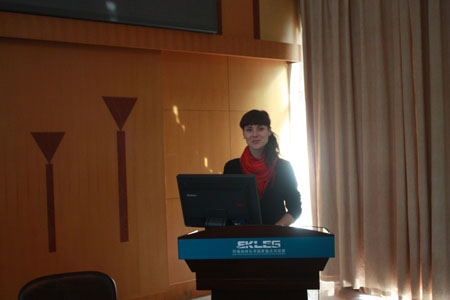 |
| Ms. Jordan Sky Oestreicher at the presentation |
From Oct 30th to Nov 1st, being invited by Prof. Feng Xinbin’s group, Ms. Jordan Autumn Sky Mycyk Oestreicher from Prof. Marc Lucotte’s group in GEOTOP at the Université du Québec à Montréal, visited Institute of Geochemistry, Chinese Academy of Sciences (IGCAS).
In the morning of Oct 31st, Ms. Oestreicher gave a presentation titled “The PLUPH project: linking agriculture and the environment to mercury exposure and Chagas disease risks in the Brazilian Amazon”, which mainly introduced the research progress of the PLUPH project and some new findings in mercury research in Amazon.
The PLUPH project (“Poor Land Use, Poor Health”) is supported by the Global Health Research Initiative, regrouping representatives of local communities, stakeholders from local, state and federal governmental institutions and key decision makers from international organizations. An international, interdisciplinary and intersectoral team were involved in this project, including UQAM, UnB, Un. Paul Descartes, etc. The project aims at reducing the gravity of two emergent and synergistic health issues in small scale farming populations of the Amazon: mercury exposure through contaminated fish consumption and transmission of Chagas disease through contact with triatomines, insect carriers of a deadly protozoan. Both hazards, which can severely and insidiously affect immune, neurological and cardiac functions, appear to be directly linked to the rapid and generalized degradation of the environment, in particular to the ever-increasing “slash and burn” practices of the tropical rain forest. The local deforestation does not bring wealth on the mid-term, leaving the populations with one of the lowest HDI (Human Development Index) of the Americas. The PLUPH project proposes to contribute to primary health prevention by implementing and testing sound land-uses in typical pilot communities of the Tapajós area, covering an ancient riparian village, and a mid-term and a new settlement of the colonization frontier. PLUPH implemented alternative modes of land use (complex agroforestry systems) to test their ability to reduce soil erosion and mercury movement as well as the growth of Attalea palm tree species, since certain triatomines infest these trees. These agroforestry systems were tested to understand their ability to improve environmental health.Ultimately, it was found that the anticipated benefits can be reached with the agroforestry systems, as they are both environmentally and economically viable.
Recent findings on mercury research were presented in two parts. According to the investigation on mercury loss through soil erosion under different land uses, including slash and burn agriculture, agro-forestry system and forest cover, on steep and slight slopes, it was found that mercury loss and soil erosion appeared to be most under slash and burn practices. Slope steepness has a positive effect on total cumulative mercury and soil loss. The second part introduced mercury sedimentary history in the sediment cores from 9 lakes. Age dating, lignin analysis and land use change analysis according to satellite image analysis and historical document analysis were also made in the sediment cores. It was shown that mercury sedimentation is largely influenced by climate factors since mercury appears to follow precipitation cycles. Although there is a lag between deforestation events and mercury accumulation in sediments, Hg does originate from areas converted to pasture land, as determined through lignin biomarker analysis.
Ms. Jordan Sky Oestreicher is a Ph D. student under the supervision of Prof. Marc Lucotte, who is a Distinguished Visiting Professor in Chinese Academy of Sciences. Prof. Lucotte has visited IGCAS for a few times since 2004. A course for graduate students he ever gave was “System dynamics in environmental Sciences”.
(By SHANG Lihai in SKLEG, revised by Jordan Sky Oestreicher)